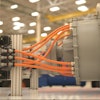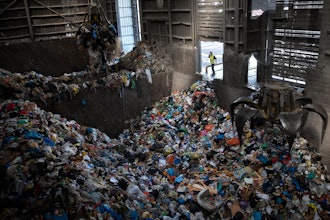KUALA LUMPUR, Malaysia (AP) -- A senior Indian official said Wednesday that Tata Motor's abandoned factory in the Indian state of West Bengal will be revived to produce Nano, the world's cheapest car, as a farmers' protest against it is tapering off.
The factory is 85 percent complete with all the machinery and equipment installed, said Sabyasachi Sen, the top bureaucrat in West Bengal's industry ministry.
"Sooner rather than later, the Nano will be produced from there," he told The Associated Press in an interview during a visit to Malaysia. The factory "won't become a white elephant."
Tata Motors has been unclear about its plans for the plant and said it would talk with the state government about future plans.
"We have our sheds there. We have the land there which is leased to us. We do not have any more information to share at this point," said Tata Motors spokesman Debasis Ray. "We will discuss whatever plans we have with the West Bengal government."
Last year, Tata Motors was forced to shut down the $350 million project in Singur, West Bengal, after weeks of violent protests by farmers whose land was acquired by the government for the factory. With production deadline approaching, Tata opened another plant to manufacture the Nano in the western state of Gujarat, thousands of miles (kilometers) away.
It introduced the Nano, a pint-sized vehicle with a price tag of about $2,200, on March 23.
However, the Gujarat factory, with a capacity of up to 500,000 cars a year, won't open until the year's end. Until then, Tata will produce 50,000 cars a year from a modified existing plant in Pantnagar in northern India.
Sen said the farmers' protest, supported by the opposition party, is now "tapering off and through a process of dialogue we hope that the little remnants of opposition will be removed."
He said Tata would have to make Nano from at least four locations. The cost of transporting cars from Gujarat to markets across the vast country would be prohibitive, making the price tag of $2,333 price tag unsustainable, he said.
"We missed the opportunity of being the first location of the Nano but we are still a location. Certainly Nano will be made from Singur," said Sen, who is in Malaysia to woo local car companies Proton and Perodua to invest in India.
He said he is constantly asked by investors about Nano's pullout, and acknowledges that it was a blow to West Bengal's reputation.
It "was a setback, but Nano was a one-off incident" that resulted from the government's failure to build a consensus among farmers before buying land from them, Sen said. "We have learned the lesson from Singur."
The government is now ensuring it builds a consensus among farmers before acquiring land for other industrial projects, he said. Most of the land in the fertile state is under cultivation.
Sen said Tata has another project in collaboration with Japan's Hitachi Ltd. to produce heavy trucks and earth-moving equipment in a place about 100 miles (60 kilometers) from Singur, which is going ahead without any trouble. Also, the Salim Group of Indonesia and a Chinese company will be making motorcycles in the state in a joint venture with Indian companies.
AP Business Writer Erika Kinetz in Mumbai contributed to this report.






















